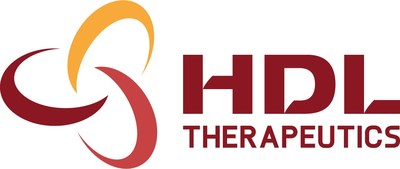Study Data Demonstrate That First-of-its-Kind Disease Modifying Investigational Therapy Significantly Reduces Plaque in Coronary Arteries and Increases Preß-HDL Particle Levels in Patients
-
Study Data Demonstrate That First-of-its-Kind Disease Modifying Investigational Therapy Significantly Reduces Plaque in Coronary Arteries and Increases Preß-HDL Particle Levels in Patients
VERO BEACH, Fla., May 15, 2019 /PRNewswire/ -- HDL Therapeutics, a clinical stage company and an emerging leader in the field of reversing coronary atherosclerosis, today announced positive data from the company’s registrational trial for its investigational acute care therapeutic device, the PDS-2™ System, in patients with homozygous familial hypercholesterolemia (HoFH). These data were presented at the American Heart Association’s Vascular Discovery: From Genes to Medicine Scientific Sessions 2019 in Boston (May 14-16, 2019). In this open-label, multicenter study of six subjects with HoFH over seven weeks, patients were evaluated for the effect of weekly serial infusions of autologous selectively delipidated pre-beta (preβ) HDL-enriched plasma on coronary atheroma, a buildup of plaque deposits on the walls of coronary arteries.

Results from this study demonstrated that increasing the level of preβ-HDL particles in patients’ plasma via the PDS-2 System led to a statistically significant 18% reduction in total atheroma cross-sectional area between baseline and follow-up (p=0.023), the study’s primary endpoint. This included a 38% reduction in total atheroma cross-sectional area between baseline and follow-up in the low-density plaques (p=0.005) and a 33% reduction in the necrotic core plaques (p=0.007). The percentage of preβ-HDL particle levels in patients’ plasma increased significantly by 65.92% (p<0.001). In this study, therapy using the PDS-2 System was well-tolerated.
“HoFH leads to premature atherosclerosis due to accelerated plaque buildup in artery walls in this patient population,” said Brian Ghoshhajra, MD, MBA, FSCCT, Service Chief of Cardiovascular Imaging at Massachusetts General Hospital, Assistant Professor of Radiology at Harvard Medical School, and presenting author of the study. “This trial demonstrated that soon after enriching patients’ pre-beta HDL levels via therapy with the PDS-2 System, CT scans showed a decrease in the size of arterial plaques. The largest reductions we observed in low-density and necrotic core portion of the plaques are noteworthy because these are associated with high-risk plaque types that have been shown to be vulnerable, meaning more prone to rupture, leading to a cardiac event such as a myocardial infarction.”
“These data support our objective to make available a disease-modifying therapy for patients living with HoFH to reverse the damage done to date in their coronary arteries and provide them with their best hope yet for combating this devastating inherited disease,” said H. Bryan Brewer, MD, Chief Scientific Officer of HDL Therapeutics, Inc. “Only the pre-beta form of HDL has been shown to regress coronary atheroma. The other form of HDL, alpha HDL, is not able to do that.”
HoFH is a rare genetic disorder characterized by abnormally high levels of low-density lipoprotein (LDL) cholesterol in the blood, which can accelerate the deposit of bad cholesterol in the walls of coronary arteries, leading to early development of atherosclerosis – a disease of the arteries – and a significantly higher risk of heart attacks. The current approach to treating HoFH is to lower LDL cholesterol levels and slow down the process of atherosclerosis. Increasing preβ-HDL levels via the PDS-2 therapy takes a unique and distinct approach to treatment. It reverses the atherosclerosis process by removing excess lipids from vessel walls and countering the effects of LDL.
“The atherosclerosis community has been working on an HDL-targeted therapy for well over a decade, and we may finally be able to deliver it pending review by the FDA,” said Michael Matin, Chairman and Chief Executive Officer of HDL Therapeutics, Inc. “The FDA has accepted our filing for review, and we look forward to bringing this therapy to patients with HoFH as quickly as possible.”
The abstract, “Coronary Atheroma Regression from Serial Infusions of Autologous Selectively Delipidated Preβ-HDL-enriched Plasma on Coronary Atheroma in Patients With Homozygous Familial Hypercholesterolemia in the HALO-FH Trial,” was presented at the American Heart Association’s Vascular Discovery: From Genes to Medicine Scientific Sessions 2019 (abstract #515) poster session on Wednesday, May 15, 2019, from 5:30-7:30 p.m. ET, in the Back Bay Conference and Exhibit Center at the Marriott Copley Square Hotel.
More information about the clinical trial can be found at https://www.clinicaltrials.gov/ct2/show/NCT03135184.
About Homozygous Familial Hypercholesterolemia
Homozygous familial hypercholesterolemia (HoFH) is a rare, inherited disorder of lipoprotein metabolism. HoFH is characterized by significantly elevated levels of low-density lipoprotein (LDL) cholesterol and accelerated deposition of LDL cholesterol in the walls of coronary arteries that results in arterial plaque formations and premature atherosclerosis, leading to heart attacks at a much younger age in patients with HoFH than would be expected in the general population. HoFH is the most severe form of familial hypercholesterolemia and, if left untreated, can lead to a cardiac event or sudden death. HoFH is usually diagnosed in infancy or childhood. The prevalence of HoFH is estimated to be as high as one in 160,000 in the U.S.1
About the PDS-2™ System
HDL Therapeutics has developed the first innovative acute care therapeutic device, the PDS-2™ System, an approach also known as HDL (high-density lipoprotein) therapy. HDL counters the effects of LDL by removing excess lipids from vessel walls and carrying them to the liver where they are eliminated. The PDS-2 System is a disease-modifying therapy that uses a patient’s own plasma to accelerate the removal of excess lipids from atherosclerotic plaques in coronary arteries.
About HDL Therapeutics
HDL Therapeutics, Inc., is a clinical stage company based on diseases regulated by preβ-HDL. The company has developed the first preβ-HDL therapy of its kind to rapidly reverse coronary atherosclerosis in patients with homozygous familial hypercholesterolemia (HoFH). An emerging leader in the field of reversing coronary atherosclerosis, the company has developed its lead investigational acute care therapeutic device, the PDS-2™ System. The company is based in Vero Beach, Florida. For more information, visit www.hdltherapeutics.com.
| Contacts: | |
| For Media: | For Investors: |
| Edie DeVine | Michael Sheridan |
| Director, Medical & Health Technology | Vice President, Investor Relations |
| GCI Health | HDL Therapeutics |
| (209) 814-9564 | |
1 National Organization for Rare Diseases (NORD) Physician Guide: Homozygous Familial Hypercholesterolemia (HoFH). NORD. 2014. Available at https://bit.ly/2VohJpM. Accessed April 23, 2019.
![]() View original content to download multimedia:http://www.prnewswire.com/news-releases/hdl-therapeutics-announces-positive-data-from-registration-trial-of-pds-2-system-in-homozygous-familial-hypercholesterolemia-300851133.html
View original content to download multimedia:http://www.prnewswire.com/news-releases/hdl-therapeutics-announces-positive-data-from-registration-trial-of-pds-2-system-in-homozygous-familial-hypercholesterolemia-300851133.html
SOURCE HDL Therapeutics, Inc.




